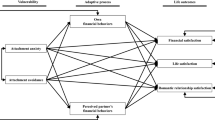Abstract
The present study represents a reinquiry and extension of Rindfleisch, Burroughs, and Denton's (1997) foundational study concerning the impact of family structure on materialism and compulsive buying in young adults. In addition to reexamining the relationships specified in the Rindfleisch et al. study, the authors of this study also examine additional and/or different relationships. The findings of their reinquiry include the following: (1) family structure is positively related to the happiness dimension of materialism; (2) the predicted direct effect of family structure on compulsive buying was not supported, suggesting that divorce may not affect compulsive buying until early adulthood; and (3) the mediating roles of family stressors and family resources, and the moderating role of socioeconomic status may require additional investigation. Directions for future research in this nascent area of inquiry are offered.
Similar content being viewed by others
References
Achenreiner, Gwen Bachmann. 1997. “Materialistic Values and Susceptibility to Influence in Children.” InAdvances of Consumer Research, Vol. 24. Provo, UT: Association for Consumer Research, 82–88.
Amato, Paul R. 1993. “Children's Adjustment to Divorce: Theories, Hypotheses, and Empirical Support.”Journal of Marriage and the Family 55 (February): 23–38.
— 2000. “The Consequences of Divorce for Adults and Children.”Journal of Marriage and the Family 62 (November): 1269–1287.
— and Alan Booth. 1991. “Consequences of Parental Divorce and Marital Unhappiness for Adult Well-Being.”Social Forces 69 (March): 895–914.
— and Bruce Keith. 1991. “Parental Divorce and the Well-Being of Children: A Meta-Analysis.”Psychological Bulletin 110:26–46.
Bagozzi, Richard P. 1991. “Further Thoughts on the Validity of Measures of Elation, Gladness, and Joy.”Journal of Personality and Social Psychology 61:98–104.
Benson, Jeri and Dennis Hocevar. 1985. “The Impact of Item Phrasing on the Validity of Attitudes Scales for Elementary School Children.”Journal of Educational Measurement 23 (3): 231–240.
Burroughs, James E. and Aric Rindfleisch. 1997. “Materialism as a Coping Mechanism: An Inquiry Into Family Disruption.”Advances in Consumer Research 24:89–97.
Chang, LinChiat and Robert M. Arkin. 2002. “Meterialism as an Attempt to Cope With Uncertainty.”Psychology and Marketing 19 (5): 389–406.
Chase-Lansdale, P. L., A. J. Cherlin, and K. E. Kiernan. 1995. “The Long-Term Effects of Parental Divorce on the Mental Health of Young Adults: A Developmental Perspective.”Child Development 66:1614–1634.
Cherlin, Andrew J. 1999. “Going to Extremes: Family Structure, Children's Well-Being, and Social Science.”Demography 36 (November): 421–428.
—, P. Lindsay Chase-Lansdale, and Christine McRae. 1998. “Effects of Parental Divorce on Mental Health Throughout the Life Course.”American Sociological Review 63 (April): 239–249.
d' Astous, Alain, Julie Maltais, and Caroline Roberge. 1990. “Compulsive Buying Tendencies of Adolescent Consumers.”Advances in Consumer Research 17:306–312.
Dreman, Sally. 2000. “The Influence of Divorce on Children.”Journal of Divorce and Remarriage 32 (3/4): 41–71.
Faber, Ronald J., and T. C. O'Guinn. 1992. “A Clinical Screener for Compulsive Buying.”Journal of Consumer Research 19:459–469.
Friese, Susanne and Hal Koenig. 1993. “Shopping for Trouble.”Advancing the Consumer Interest 5 (1): 24–32.
Kasser, Tim. 2002.The High Price of Materialism. Cambridge, MA: MIT Press.
Kot, Lee Ann and Holly M. Shoemaker. 1999. “Children of Divorce: An Investigation of the Developmental Effects From Infancy Through Adulthood.”Journal of Divorce and Remarriage 31 (1/2): 161–178.
Pilotte, William J. and Robert K. Gable. 1990. “The Impact of Positive and Negative Item Stems on the Validity of a Computer Anxiety Scale.”Educational and Psychological Measurement 50 (3): 603–610.
Richins, Marsha L. 1987. “Media, Materialism, and Human Happiness.” InAdvances of Consumer Research, Vol. 14. Provo, UT: Association for Consumer Research, 352–356.
— 1994. “Special Possessions and the Expression of Material Values.”Journal of Consumer Research 21 (December): 522–533.
— and Scott Dawson. 1992. “A Consumer Values Orientation for Materialism and Its Measurement: Scale Development and Validation.”Journal of Consumer Research 19 (December): 303–316.
Rindfleisch, Aric, James E. Burroughs, and Frank Denton. 1997. “Family Structure, Materialism, and Compulsive Consumption.”Journal of Consumer Research 23 (March): 312–325.
Roedder-John, Deborah. 1999. “Consumer Socialization of Children: A Retrospective Look at Twenty-Five Years of Research.”Journal of Consumer Research 26 (December): 183–213.
Sarason, Irwin G., James H. Johnson, and Judith M. Siegel. 1978. “Assessing the Impact of Life Changes: Development of the Life Experiences Survey.”Journal of Consulting and Clinical Psychology 46 (October): 932–946.
Wallerstein, Judith, Julia Lewis and Sandra Blakeslee. 2000.The Unexpected Legacy of Divorce. New York: Hyperion.
Author information
Authors and Affiliations
Additional information
James A. Roberts (jim_Roberts@baylor.edu) (Ph.D., University of Nebraska-Lincoln) is the W. A. Mays Professor of Entrepreneurship and associate professor of marketing at Baylor University. He has had articles published in numerous journals including theJournal of Consumer Affairs, theJournal of Business Research, theJournal of Public Policy and Marketing, Business Horizons, Psychological Reports, theJournal of Marketing Theory and Practice, theJournal of International Consumer Marketing, theJournal of Social Behavior and Personality, theJournal of Personal Selling and Sales Management, Industrial Marketing Management, theJournal of Managerial Issues, theEducation Review, theJournal of Marketing Management, and various conference proceedings. Areas of research include selling and sales force management, compulsive buying, socially and ecologically conscious consumer behavior, and advertising-related issues. Current research efforts focus on the marketing/entrepreneurship interface.
Chris Manolis (manolis@xavier.edu) is an associate professor of marketing at Xavier University in Cincinnati, Ohio. He received his Ph.D. from the University of Kentucky, and his research interests include the study of psychological and behavioral processes of exchange participants and various methodological/empirical research issues. His research has appeared in a number of journals, including theJournal of Business Research, theJournal of Consumer Psychology, theJournal of Consumer Marketing, theJournal of Services Marketing, Basic and Applied Social Psychology, andStructural Equation Modeling.
Joh F.(Jeff) Tanner Jr. (jeff_tanner@baylor.edu) (Ph.D.,University of Georgia) serves as associate dean at Baylor University. His research interests are the use of marketing technology to promote responsible behavior and customer relationship management. He has published research in theJournal of Marketing, theJournal of Business Research, theJournal of Public Policy & Marketing, and others.
Rights and permissions
About this article
Cite this article
Roberts, J.A., Manolis, C. & Tanner, J.F. Family structure, materialism, and compulsive buying: A reinquiry and extension. JAMS 31, 300–311 (2003). https://doi.org/10.1177/0092070303031003007
Issue Date:
DOI: https://doi.org/10.1177/0092070303031003007



